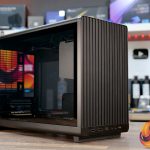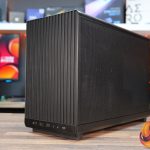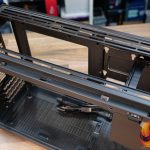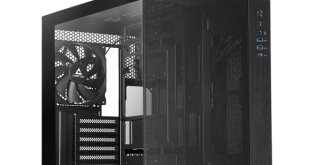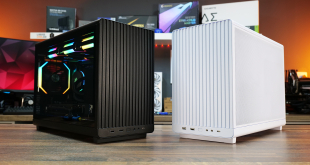
The new Lian Li x Dan Cases A3-mATX can squeeze into its micro form factor frame an mATX motherboard, a 451mm long 4-slot graphics card, an ATX power supply, up to 10 fans and a 360mm radiator. With all this packed into a 26-litre chassis, does the A3-mATX make mini-ITX obsolete? Surely there must be some compromises? Well, that is what we are here to find out, so let's take a closer look at this case and see what all the fuss is about.
Timestamps:
00:00 Intro
00:42 What is the A3-mATX? Pricing/background info
02:13 Starting the teardown
03:32 Chassis PSU/rad/fan support
05:50 Rear chassis options
06:55 Mobo tray/storage
08:20 PSU bracket adjustment
10:18 Installation hardware
11:46 Build TIMELAPSE!
15:06 James’ thoughts on the build
15:40 Thermal testing
17:01 Closing thoughts
Lian Li | Dan Cases A3-mATX Features:
- The A3-mATX features a versatile micro form factor and compact 26-litre capacity that supports mid-tower characteristics such as up to 415mm long 4 slot graphics cards, 360mm radiator or AIO installation and big CPU tower coolers.
- 3-sided high airflow mesh outer panels for optimal cooling of the internal components.
- A removable PSU bracket that can be located at the front or side of the case in various positions to suit different cooling configurations.
- Optional accessories include a tempered glass side panel and vertical GPU mounting kit.
Specifications:
- Case Type: mATX
- Dimensions: (D) 443mm x (W) 194mm x (H) 321.5mm
- Material: Steel
- Motherboard Support: mATX/ITX
- Expansion Slots: 4
- Storage Bays: 2 x Tray / 1 x Floor (2.5”), 1 x Floor (3.5”)
- Max GPU Length: 415mm
- Max CPU Cooler Height: 165mm
- Max PSU Size: ATX/SFX/SFX-L (Max 220mm)
- Fan Support: 3 x 120mm / 2 x 140mm(Top) 3 x 120mm / 2 x 140mm (Side) 3 x 120mm / 2 x 140mm (Bottom) 1 x 120mm (Rear)
- Pre-installed fans: N/A
- Radiator Support: 360mm / 280mm / 240mm (Top, side) 1 x 280mm/ 240mm (Floor)
- Dust Filters: 1 x Floor
- Font I/O: 2 x USB 3.0 Type-A, 1 x USB Gen 2 Type-C, 2 x 3.5mm Audio
Thermal Performance Testing
To simulate thermal demand we run the Cinebench R23 multi-thread benchmark and 3DMark Speed Way stress test simultaneously in a loop for 30 minutes to load the system fully. This gives the CPU and GPU enough time to reach constant steady-state temperature. With this data, we can compare how the system handles the thermal demand and measure peak noise levels.
Thermal performance is measured with the case in various configurations, such as the default, with the tempered glass left-hand side panel removed and with the front panel removed to see how these configurations affect the CPU and GPU temperature. During testing, only stock case fans are used unless otherwise specified. All water pumps are set to maximum RPM and fans are set to a custom RPM curve by the Motherboard software/BIOS.
All temperature measurements are presented as Deltas – meaning the ambient temperature has been deducted from the CPU temperature giving us a Delta. Data shown in the charts represent the average component temperature over the length of the test as measured by HWiNFO and then the last 15 minutes of the data are calculated to get the average. The ambient temperature during thermal tests is between 19-20⁰C.
Test System Specification:
- CPU – AMD Ryzen 9 7950X
- Motherboard – MSI MEG B650M Mortar
- Graphics Card – Sapphire RX 7900XTX Nitro+
- Memory – 64GB G.SKILL Trident Z5 RGB DDR5-6400
- Storage – 1TB Corsair MP700 PCIe Gen5 M.2 NVME SSD
- CPU Cooler – Silverstone ICEMYST 360 AIO
- Power Supply – FSP Hydro PTM X PRO ATX3.0(PCIe5.0) 1200W
- Case fans – Lian Li UNIFAN SL120 V2
- Chassis – Lian LI | Dan Cases A3-mATX
- Operating System – Windows 11
Thermal Performance Overview
We tested thermals with the case in several configurations using a 360mm AIO CPU cooler.
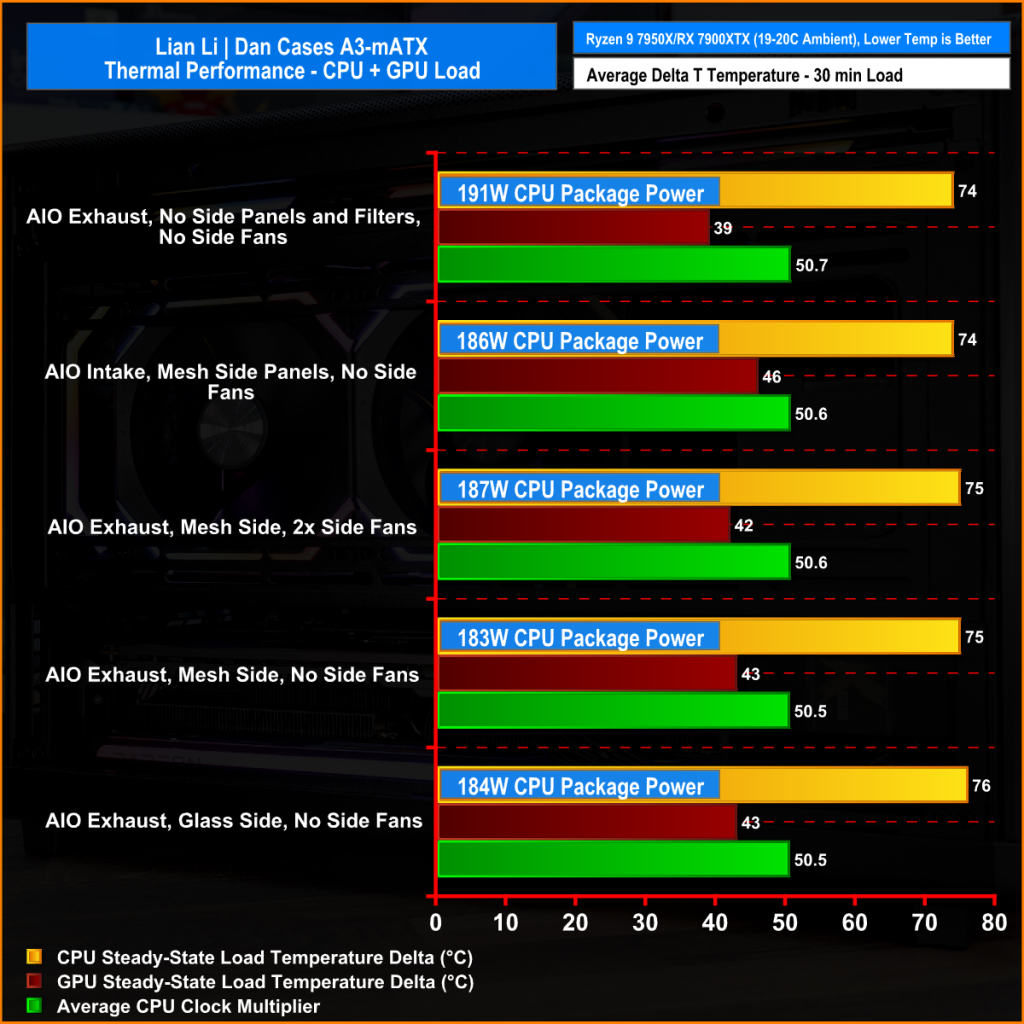
The best balance between CPU/GPU temperature and CPU clock frequency is with the mesh side panel and 2 x side fans installed.
However, we found that changing to the glass side or removing the side fans only contributed to a maximum 2°C increase in CPU temperature, while the GPU temperature remained constant at 43°C.
Swapping the AIO fans so they worked as intakes pulling in cooler outside air reduced CPU temperature slightly but this significantly increased GPU temperature, so we wouldn't recommend this configuration.
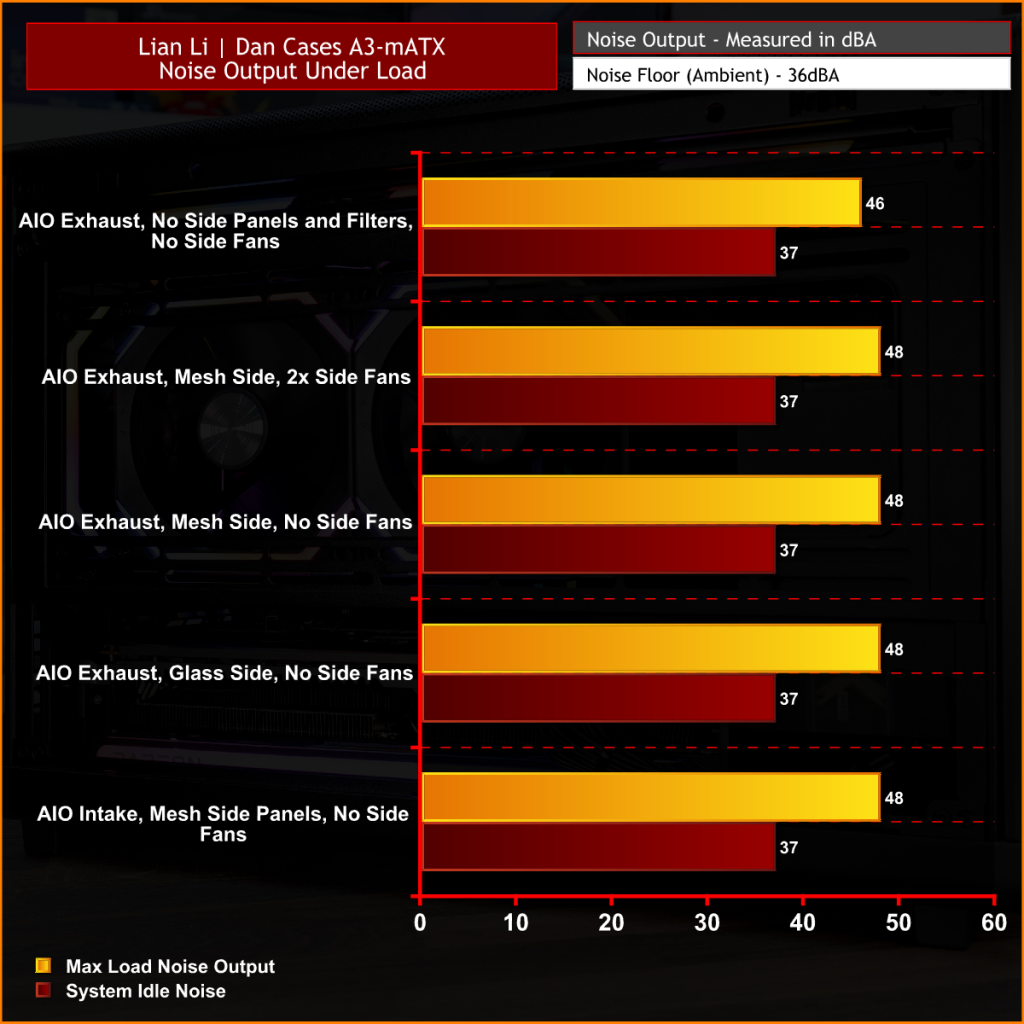
Due to the lower CPU and GPU temperature with all case panels removed, the system is at its quietest in this configuration, since the GPU fan speed doesn’t ramp up as high.
The system is at its loudest with the AIO set as intake as the GPU temperature is higher, therefore the fans are running faster.
But in all other configurations, system noise is around 48dBA which is noticeable, but still at under 50dBA it's not too distracting.
Closing Thoughts
This latest Lian Li x Dan Cases creation is exactly what mATX should be. It’s very compact at just 26-litre capacity but still offers support for genuinely high-end hardware, perfect for a small gaming PC. Often with mini-ITX, there are some pretty big compromises to be made when building a system such as RAM limitations, cooling, power delivery and the graphics card size. The A3-mATX solves all those problems while still being compact enough to be considered small form factor.
However, like any case it does have some minor negatives that are worth pointing out. Due to the size limits of the case, installing a 360mm radiator or AIO with a motherboard that has tall VRM heatsinks is very tight. In our test build the MSI MEG B650M Mortar VRM heatsink is contacting the top-mounted radiator, it's also very close to the EPS power cables, almost too close for comfort. This also means that connecting anything to the top of the motherboard with the rad in place is virtually impossible.
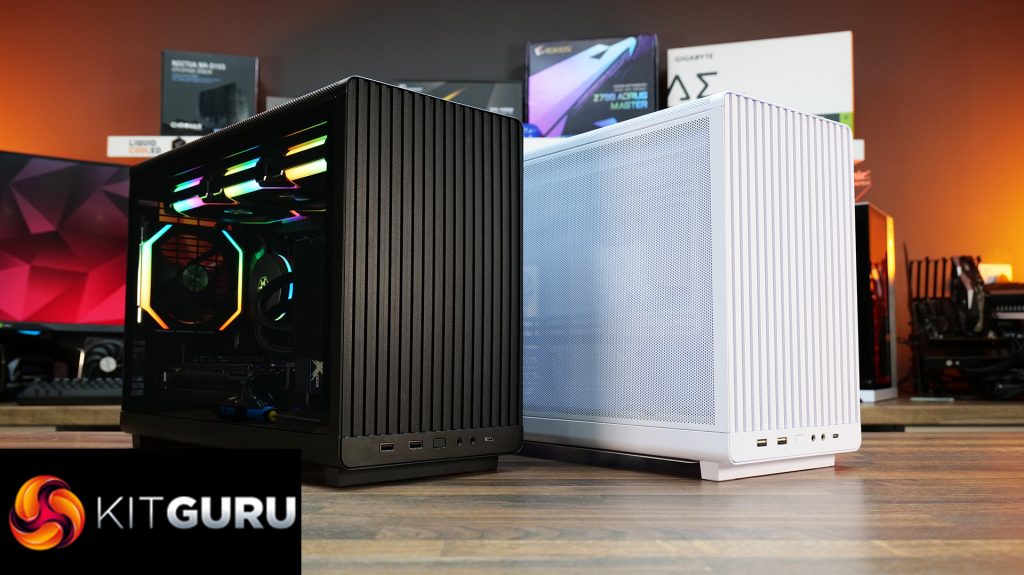
It would be beneficial to the case to have a removable top panel/top radiator bracket, it would improve access and simplify installation. The same could be said for the floor of the case, again this would benefit from a removable panel. With the power supply in place, it’s a fiddly job getting a graphics card in, a removable floor would solve this. There are no real cable management features built into the case either.
But even with those negatives, I still think the A3-mATX is a very good case. The compact size, support for large AIO and air coolers combined with the huge 4-slot graphics card compatibility and ATX power supply support make it perfect for a small gaming system. During our testing, too, the CPU and GPU temperatures were not far off what we would expect of larger ATX cases, so it’s a win all round for Lian Li with the A3-mATX.
The Lian Li | Dan Cases A3-mATX is available to purchase now from OverclockersUK priced at £69.95 HERE.
Pros:
- Available in black or white.
- It crams in hardware you would expect from bigger cases.
- Multiple PSU and Storage drive mount positions create flexibility.
- Similar thermal performance as larger ATX cases.
Cons:
- 360mm radiators can be a very tight fit with VRM heatsinks.
- No removable top rad bracket or floor panel.
- No real cable management features.
KitGuru says: If you want a compact case but feel too restricted by mini-ITX then this could be the case for you!
 KitGuru KitGuru.net – Tech News | Hardware News | Hardware Reviews | IOS | Mobile | Gaming | Graphics Cards
KitGuru KitGuru.net – Tech News | Hardware News | Hardware Reviews | IOS | Mobile | Gaming | Graphics Cards



